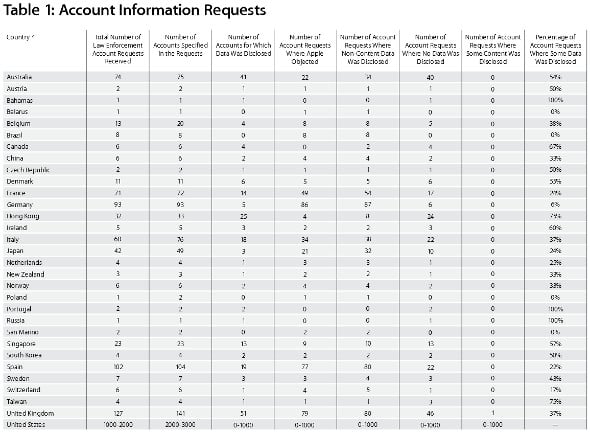Apple Delivers Data Request Transparency Report, US Requests Top List By Far
Like many other tech companies, Apple is publishing a data request transparency report so its users will have a better sense of the number of inquiries law enforcement makes about the company’s users and their data, and like those other companies, Apple is somewhat hamstrung, bound by law to keep details about many of the requests confidential.
“At the time of this report, the U.S. government does not allow Apple to disclose, except in broad ranges, the number of national security orders, the number of accounts affected by the orders, or whether content, such as emails, was disclosed,” reads the report. Apple is clear that it’s against this practice, calling it a gag order.
What Apple is able to reveal, however, shows that U.S. law enforcement is significantly more prolific about data requests than all other countries combined. The U.S. made between 1,000 and 2,000 total law enforcement account requests between January 1st and June 30th of this year. The next closest was the UK with 127 requests, followed by Spain, with 102. There were 93 requests from Germany, and no other country made more than 75 requests.
The most cloying bit of data is way down at the bottom corner of the chart, under the “Percentage of Account Requests Where Some Data Was Disclosed” column: For the U.S., that number isn’t available at all.

(Click to enlarge)
Although these simple numbers alone tell us something, the data is maddeningly limited. Apple notes that they could only report requests in increments of 1,000, and national security orders had to be lumped in with law enforcement requests.
The company did share that a very small amount of requests Apple received are hunting for personal information from services such as iTunes, iCloud, or Game Center; mostly, the requests look for “customer identifying information, email, stored photographs, or other user content stored online”, which sounds deeply invasive, but Apple said that the most common requests pertain to crimes such as robberies and other crimes, searching for missing persons, or suicide prevention.

Note that Apple separates these account requests from device requests, which typically involve a user-initiated effort to find a lost or stolen phone.
Apple and other tech companies are fighting this opaque method of data request disclosure, although perhaps surprisingly, the normally litigious Apple isn’t keen on pursuing this issue in the courts, relying instead on “dialogue and advocacy” to work to transform the problem of transparency. That said, Apple has filed an Amicus brief with FISA, the NSA shadow court, and plans to file another with the Ninth Circuit Court to request the ability for more transparency.
“At the time of this report, the U.S. government does not allow Apple to disclose, except in broad ranges, the number of national security orders, the number of accounts affected by the orders, or whether content, such as emails, was disclosed,” reads the report. Apple is clear that it’s against this practice, calling it a gag order.
What Apple is able to reveal, however, shows that U.S. law enforcement is significantly more prolific about data requests than all other countries combined. The U.S. made between 1,000 and 2,000 total law enforcement account requests between January 1st and June 30th of this year. The next closest was the UK with 127 requests, followed by Spain, with 102. There were 93 requests from Germany, and no other country made more than 75 requests.
The most cloying bit of data is way down at the bottom corner of the chart, under the “Percentage of Account Requests Where Some Data Was Disclosed” column: For the U.S., that number isn’t available at all.

(Click to enlarge)
Although these simple numbers alone tell us something, the data is maddeningly limited. Apple notes that they could only report requests in increments of 1,000, and national security orders had to be lumped in with law enforcement requests.
The company did share that a very small amount of requests Apple received are hunting for personal information from services such as iTunes, iCloud, or Game Center; mostly, the requests look for “customer identifying information, email, stored photographs, or other user content stored online”, which sounds deeply invasive, but Apple said that the most common requests pertain to crimes such as robberies and other crimes, searching for missing persons, or suicide prevention.

Note that Apple separates these account requests from device requests, which typically involve a user-initiated effort to find a lost or stolen phone.
Apple and other tech companies are fighting this opaque method of data request disclosure, although perhaps surprisingly, the normally litigious Apple isn’t keen on pursuing this issue in the courts, relying instead on “dialogue and advocacy” to work to transform the problem of transparency. That said, Apple has filed an Amicus brief with FISA, the NSA shadow court, and plans to file another with the Ninth Circuit Court to request the ability for more transparency.

